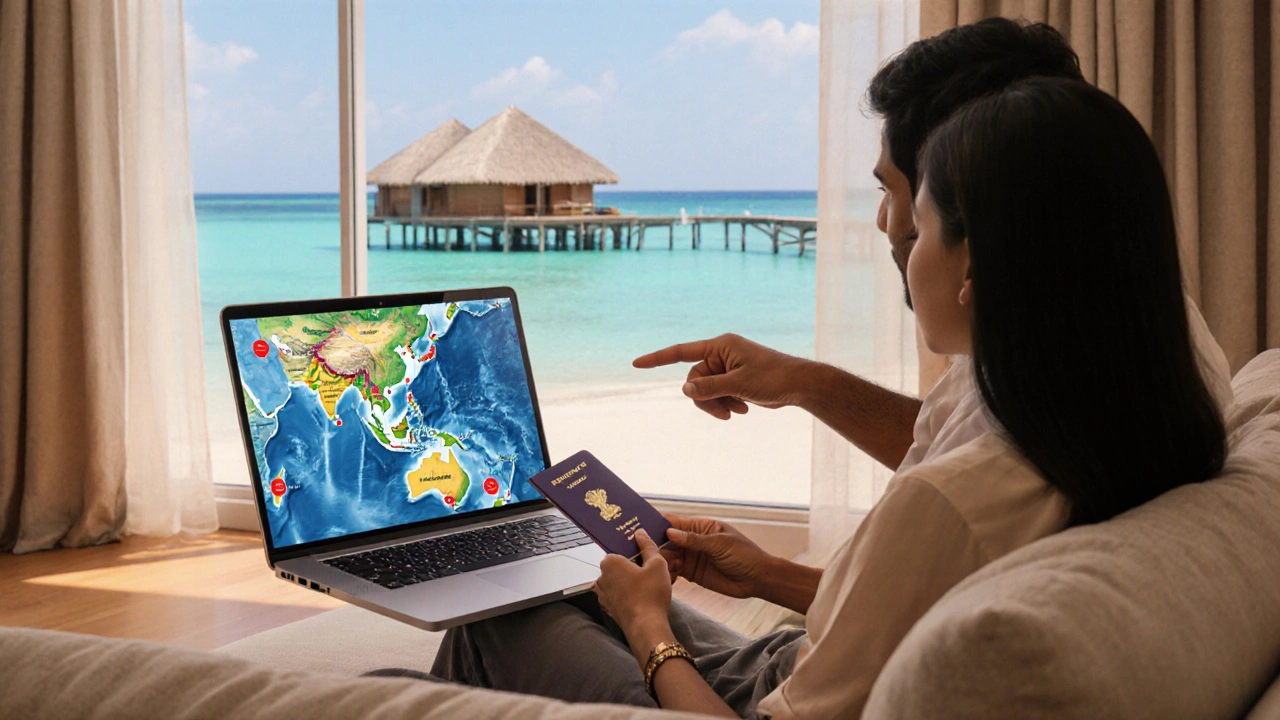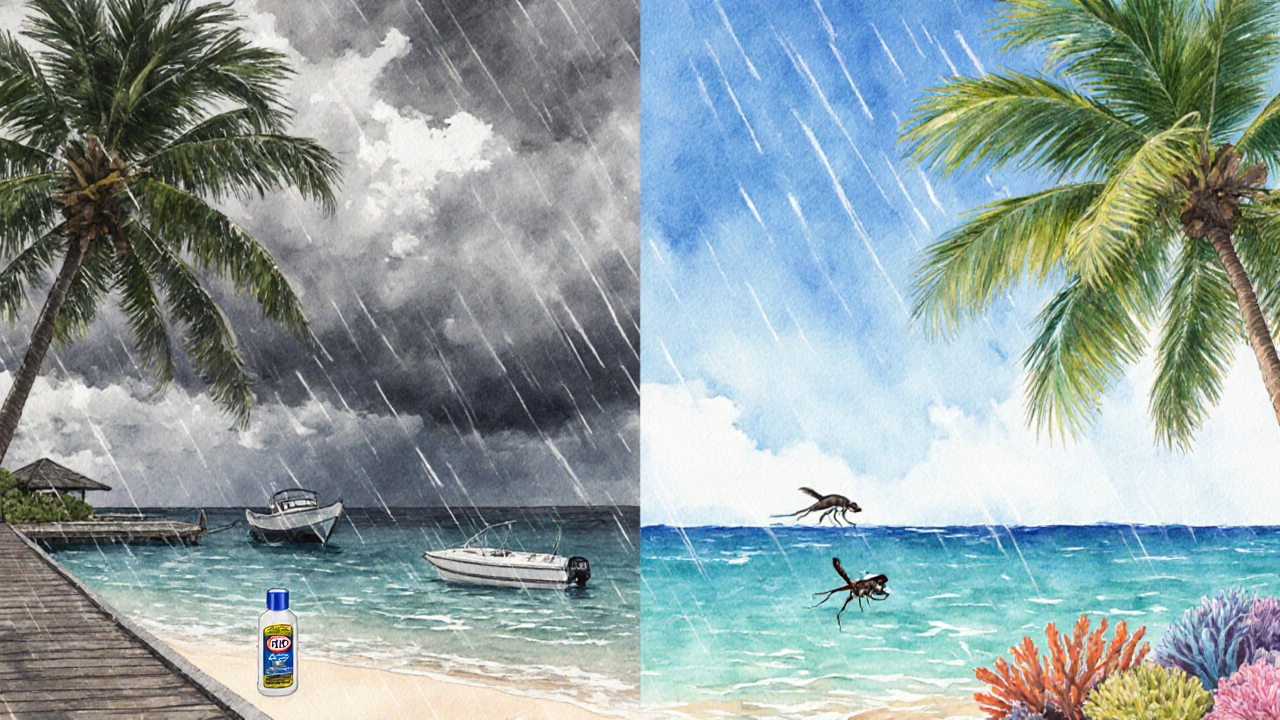Maldives Travel Safety for Indian Tourists in 2025
 Oct, 12 2025
Oct, 12 2025
Maldives Weather Window Calculator
Travel Safety Guide
November to April offers calm seas, clear skies, and minimal flight disruptions. The monsoon months (May-October) can still be visited but expect occasional rain and possible delays.
When planning a getaway, the first question on most Indian travelers' minds is whether the destination is truly safe. Maldives is a tropical island nation in the Indian Ocean known for its over‑water bungalows, crystal‑clear lagoons and vibrant marine life. As of October 2025, the country’s safety landscape is shaped by health protocols, political stability, weather patterns and entry regulations - all of which matter to Indian tourists.
Key Takeaways
- COVID‑19 restrictions are lifted; a negative test is no longer required for entry.
- Political situation remains stable; no travel bans from the Indian Ministry of Home Affairs.
- Peak monsoon (May‑October) can cause flight delays; November‑April is the safest window weather‑wise.
- Visa on arrival for Indian citizens is still free for 30 days, but the e‑visa system is faster.
- Standard travel insurance covering health and weather disruptions is strongly recommended.
Current Health Landscape
The World Health Organization (WHO) released its latest regional bulletin in August 2025 stating that the Maldives reports a Maldives travel safety rating of "Low Risk" for communicable diseases. The country has fully rolled back its COVID‑19 testing mandate for visitors, aligning with India’s own relaxed rules. However, dengue fever spikes between June and September, so travelers should use mosquito repellent and wear long sleeves during evenings.
World Health Organization advises keeping routine vaccinations up to date - especially HepatitisA, Typhoid and Tetanus - before heading to the islands.

Political and Security Situation
India’s Ministry of Home Affairs (MHA) last updated its travel advisory for the Maldives on 2October2025, confirming that the nation remains "low threat" for Indian nationals. The Maldivian government, led by President IbrahimMohamedSolih, continues a policy of political openness, and there have been no major protests or civil unrest in the past year.
Crime rates against tourists are low; most reports involve petty theft in crowded markets. Local police stations in Malé and major resort islands have dedicated tourist liaison officers to assist visitors.
Weather and Natural Risks
The Maldives sits in the tropical belt, meaning it experiences a distinct monsoon season. From May to October, the Southwest Monsoon brings heavier rains and stronger winds, which can lead to flight cancellations and limited water‑sport activities. The best window for sun‑bathing and snorkeling is November through April, when the sea is calm and visibility exceeds 30meters.
Sea‑level rise is a long‑term concern. The Maldives Climate Authority projects an average rise of 5mm per year, but this does not affect short‑term travel plans.
Entry Requirements and Visa Details
Indian passport holders enjoy visa‑on‑arrival for up to 30days, free of charge. In 2024, the Maldives introduced an e‑visa portal that processes applications in under 48hours. Required documents include:
- Valid Indian passport (minimum 6months validity).
- Proof of onward or return travel (flight itinerary).
- Hotel reservation or invitation letter.
No vaccination certificate is needed, but travelers should carry a copy of their COVID‑19 vaccination record for airline compliance.

Travel Logistics: Flights, Transfers, and Insurance
Major Indian cities (Delhi, Mumbai, Bengaluru, Chennai) have direct or one‑stop flights to Malé via airlines such as Air India, SriLankan Airlines and Emirates. The International Air Transport Association (IATA) reports an average on‑time performance of 78% for Maldives routes in Q32025, slightly lower during monsoon months.
Once in Malé, most resorts provide speedboat or seaplane transfers. Prices vary: speedboat transfers cost US$30‑$60 per person, while seaplane rides range from US$150‑$250.
Travel insurance should cover:
- Medical emergencies - especially for dengue or unexpected illness.
- Trip interruption due to weather‑related flight delays.
- Lost or delayed luggage during transfers.
Practical Safety Checklist for Indian Travelers
| Item | Check | Notes |
|---|---|---|
| Passport validity (6months) | ✅ | Renew early to avoid last‑minute issues. |
| E‑visa or visa‑on‑arrival | ✅ | E‑visa is faster; print confirmation. |
| Vaccinations (Hep A, Typhoid, Tetanus) | ✅ | Check WHO recommendations. |
| COVID‑19 vaccine proof | ✅ | Carry a digital copy for airlines. |
| Travel insurance (health + weather) | ✅ | Confirm coverage for dengue treatment. |
| Sun protection (SPF50+, hat) | ✅ | UV index often above 11. |
| Mosquito repellent (DEET30%) | ✅ | Especially important June‑September. |
| Local emergency numbers (112) | ✅ | Save in phone contacts. |
Frequently Asked Questions
Do I need a COVID‑19 test to enter the Maldives from India?
No. The Maldives lifted the PCR‑test requirement for all tourists in July2025. A vaccination certificate is still recommended for airline check‑in.
Is the Maldives safe for solo Indian women travelers?
Yes. Crime rates are low, and most resorts have 24‑hour security. Solo travelers should avoid isolated beaches after dark and keep valuables in the hotel safe.
What is the best time of year to visit for safe weather?
November to April offers calm seas, clear skies and minimal flight disruptions. The monsoon months (May‑October) can still be visited but expect occasional rain and possible delays.
Are there any travel bans for Indian citizens?
No. The Indian Ministry of Home Affairs lists the Maldives under "No Restrictions" as of the latest advisory dated 2Oct2025.
Do I need to convert currency before arrival?
Maldives uses the Maldivian Rufiyaa (MVR). Indian Rupees are widely accepted at resorts and major hotels, but it’s cheaper to exchange a small amount at the airport and use credit cards for larger purchases.